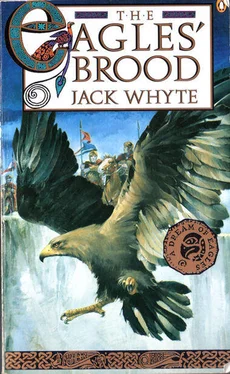By noon the following day, nevertheless, we were well along on the road again and the air was warming rapidly, the cloud cover breaking up and scattering to allow weak sunlight to fall through so that the spirits of our men brightened visibly. I rode in a pensive frame® of mind, once again mulling over the conversation I had had with Bishop Patricius regarding the fate of the priest Remus. I pulled my mount around at one point and rode back towards the tail of our column looking for Lucanus, feeling a sudden need to talk with him, but I found him talking earnestly with Cyrus Appius, his concentration wholly taken up with their conversation and his efforts to keep up with Appius's superb horsemanship. I turned back before I reached them, suddenly unwilling to interrupt their colloquy simply to allay my own boredom. At the head of the column once more, I cleared my mind of my previous thoughts, straightened my shoulders and increased the pace slightly, smiling to myself as I did so, feeling a small, malicious pleasure in knowing that poor Luke would have to work harder than ever now to keep his mind on the two matters demanding his attention. The sun shone fully on my shoulders, warm and pleasant, and I felt better than I had in days.
Later that afternoon, breasting a hill crest, I saw a green, unbroken meadow falling gently away before me with no sign of snow anywhere and, acting purely on impulse, I reined in my horse and waited until the head of the column caught up to me. Cyrus Appius approached me, a question on his face, and I grinned at him.
"Our horses need a ran, Cyrus, and we need to blow away some cobwebs. There's an empty valley below us, on a long, easy slope. Deploy your men in squadrons. We're going to attack it." I turned to Donuil. "Take my standard to Rufio and tell him to ride with it until he is half-way up the opposite slope yonder. When our men reach the valley bottom, he is free to go where he will. The first man to reach him and claim the standard wins a flask of my own best wine for each of his squad mates tonight when we make camp. But tell Rufio I don't want him easily caught." I spoke again to Cyrus Appius. "It's about two miles, plus whatever Rufio can gain. What do you think?" He grinned at me, saluted, and swung away to issue his orders.
I rode with them, exulting in the exhilaration of the charge and trying to be at the finish when Rufio was finally run down, but I was a hundred paces distant, my big horse faltering, when one of Cyrus's own squadron claimed the prize amid cheers and jeers and groans of disappointment. By the time the confusion and merriment had worn itself out and some kind of order had been restored, the sun was beginning to sink low and I called for my officers to set up camp again. It was a happy camp that night, and I went to sleep well pleased with myself and my men.
Two days later, we sat, stunned, at the top of another hill, gazing at the smouldering ruins of what had been the little town of Alchester. Pellus had brought the news personally, and we had ridden hard for three hours to arrive here, although we knew we were far too late to be of any assistance to anyone. His scouts had found only smouldering ruins early drat morning, which meant that the conflagration had occurred at least the day before, since they would have seen the flames had they burned at night. In the tiny forum in front of the town hall lay a heaped pile of bodies, more than seventy of them, and another thirty charred, hideous, doll-like obscenities had been found within the basilica itself. Most of the corpses in the square were men, boys and infants of both sexes. Only four ancient, withered female corpses were counted. The remains in the basilica could have been anything.
Pellus had ridden to consult with one of his scouts as soon as we breasted the hill and now he came galloping back up towards us.
"They came from the west, along the main road." Pellus was a gruff-spoken man who had no time for titles or military courtesies, and I had long since grown used to his ways. "A big party, well over a hundred strong, but we already knew that. My men tell me they headed back the same way they came. Left lots of signs, and spilled off the road surface into the soft ground on each side. Big party. Don't know who they are, but they're not Saxons; we're too far from the sea, and they've got horses."
I glared at him. "These are cavalry?"
He shook his head. "Didn't say that. Said they had horses. Probably wagons, too. But there's a lot of them on foot. Took what booty they could find, though there couldn't have been much here worth having, and ail the women. My man Paulo reckons they're a day, a day and a half ahead of us, taking their time. Won't be expecting any opposition. Damn sure won't expect us to be running up behind them."
"Their misfortune," I snapped, turning to Cyrus Appius. "Forced pace from here on out. Issue dry rations to all ranks as we move; we'll eat on horseback. Quarter-hour rest every ten miles: I want to catch these people by this time tomorrow. Tell your people." I turned back to Pellus. "I want you and all your men far out in front, in a narrow arc. Don't worry about our flanks. These people don't know we're coming. Tell your people to find them as quickly as they can, then keep them in sight, but to stay out of sight themselves. They know what to do, and you know what to tell them. Move out now."
We rode far into the night, stopping to sleep for only four hours, then rising and saddling up long before dawn, so that by the time the skies began to lighten behind us in the east, we had already covered ten miles along the solid Roman road, and it was there that a returning scout met us with the news that the enemy was less than three miles ahead, still in camp. Pellus had estimated their numbers at something less than three hundred, of whom less than one hundred were mounted. The most puzzling part of the scout's report, however, was the indication—and it was only an indication, since no one had been able to get close enough for absolute confirmation—that there were no non-combatants among the enemy. No women and no prisoners. Surprised, but not unduly concerned, I concluded that the women had either been killed or—a more likely alternative since we had found no corpses, and women might be considered a valuable commodity in terms of slave prices—they had been detached and sent off by some other route to await eventual collection and disposal. I decided to attack the sleeping camp immediately.
We charged out of the rising sun and surprised the strangers in a short, hard, bitter fight. It was a complete rout, and our trumpeters had to blow long and hard to recall our blood-hungry troopers from their pursuit of the fleeing remnants of the raiding party. We lost twenty-three dead and twice that number wounded, as opposed to one hundred and eighty-one enemy dead and no prisoners. I estimated that about a hundred of them had escaped, but the news brought to me by Centurion Rufio dispelled any thought of giving chase to them. Rufio had fought and killed one of their leaders, and before the man died he had damned Rufio, telling him that Gulrhys Lot of Cornwall Would take revenge for this.
The news appalled me. If Lot was on the rampage again, and this far north—more than a hundred miles above and to the east of our Colony—then my place was in Camulod, and I had no time to waste in getting there. Now, however, thanks to this latest episode, I had more than forty disabled men with injuries ranging from slight cuts to serious wounds, and only a hundred and thirty-some sound fighters remaining, which meant that I could not reasonably split my forces and drive on to Camulod in the cause of urgency. To leave our wounded behind, even with a strong escort, in territory that might be swarming with hostile forces, would be to condemn them to death. The corollary was that my own remaining troops, minus the escort for the wounded, would be depleted to the point of dangerous folly in the event that we encountered serious opposition on our route south. I cursed myself for having tied my men, through what I could only define as my own culpable ignorance and irresponsibility, to the pace at which the most seriously wounded could travel—a snail's crawl.
Читать дальше









